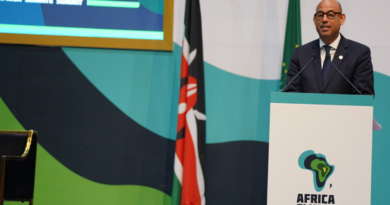Namibia emerges 75th future Party to Minamata Convention
Barely two weeks to the commencement of the first Conference of the Parties (COP 1) to the Minamata Convention on Mercury holding in Geneva, Switzerland, the government of Namibia on Wednesday September 6, 2017 deposited her instrument of ratification thereby becoming the 75th future Party to the Convention.
The development followed that of Brazil on August 8, 2017 where it emerged the 74th Party to the Convention.
Expectedly, Parties to the Convention will gather in Geneva from 24-29 September where critical issues on how to address mercury pollution will be address. The weeklong meeting that will cumulate in High-level segment on 28 and 29 will bring together governments, civil society groups and media among others.
A milestone for entry into force of the Minamata Convention on Mercury was reached on May 18, 2017 when the European Union and seven of its countries including Bulgaria, Denmark, Hungray, Malta, Netherlands, Romania and Sweden had on May 18 deposited the instrument of ratification bringing the total ratifications to 51.
Consequently, the Minamata Convention on Mercury enters into force on August 16, 2017. So far, 53 countries out of the 128 countries that signed the Convention have ratified it.
The Convention is a global treaty that seeks to protect human health and the environment from the adverse effects of mercury. It was agreed at the fifth session of the Intergovernmental Negotiating Committee on mercury in Geneva, Switzerland on the morning of Saturday, January 19, 2013 and adopted later that year on 10 October 2013 at a Diplomatic Conference (Conference of Plenipotentiaries), held in Kumamoto, Japan.
The Convention draws attention to a global and ubiquitous metal that, while naturally occurring, has broad uses in everyday objects and is released to the atmosphere, soil and water from a variety of sources. Controlling the anthropogenic releases of mercury throughout its lifecycle has been a key factor in shaping the obligations under the Convention.
Major highlights of the Minamata Convention include a ban on new mercury mines, the phase-out of existing ones, the phase out and phase down of mercury use in a number of products and processes, control measures on emissions to air and on releases to land and water, and the regulation of the informal sector of artisanal and small-scale gold mining. The Convention also addresses interim storage of mercury and its disposal once it becomes waste, sites contaminated by mercury as well as health issues.



